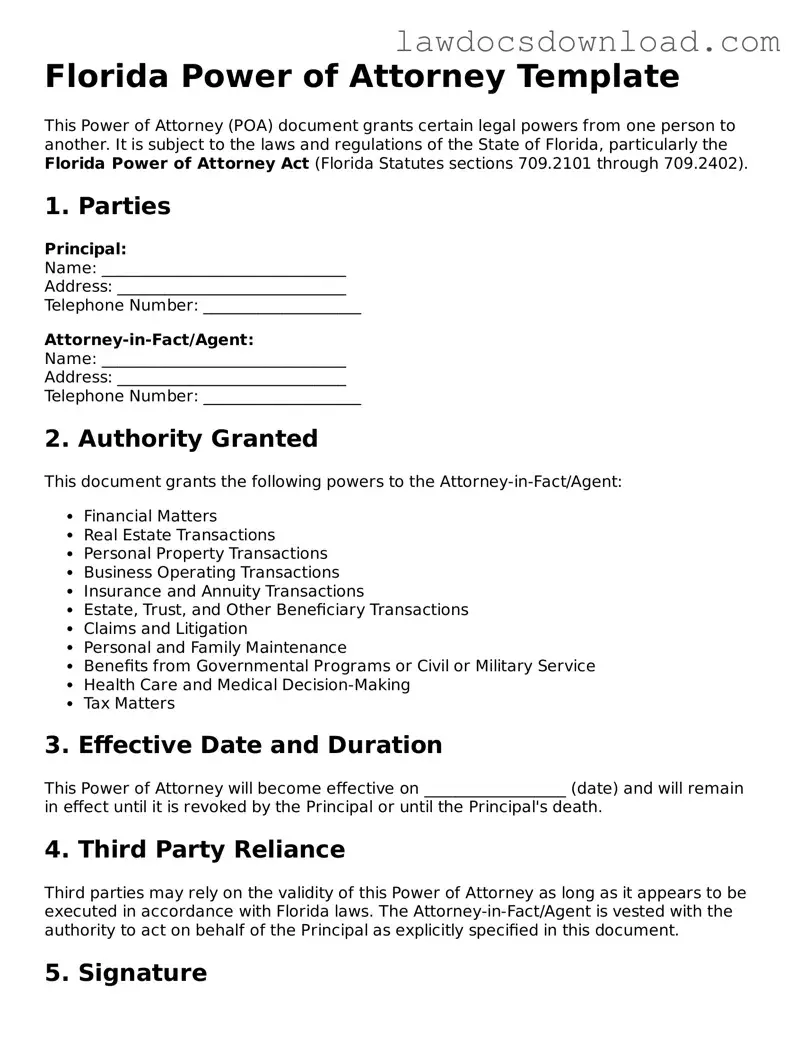The Medical Directive or Advance Healthcare Directive bears similarity to the Florida Power of Attorney form as both documents empower another individual to make decisions on the grantor's behalf. In the case of a Medical Directive, the focus is on healthcare decisions, including treatment options and end-of-life care, reflecting the Power of Attorney's role in decision-making but within the specific context of healthcare.
A Durable Power of Attorney for Finances resembles the Florida Power of Attorney form, as it delegates authority to another person to manage the principal's financial affairs. This can include paying bills, managing investments, and handling real estate transactions. Both documents remain effective even if the principal becomes incapacitated, ensuring that the principal's financial responsibilities are taken care of.
The Living Will, while specifically directed towards healthcare decisions at the end of life, like the refusal or request of certain medical treatments, shares a foundation with the Florida Power of Attorney by allowing an individual to outline their preferences in written form for future scenarios in which they cannot express their wishes directly.
The Last Will and Testament shares the anticipatory nature of the Florida Power of Attorney, with a focus on the distribution of the estate after the individual has passed away. Although the Power of Attorney ceases to be effective upon the principal’s death, both document types are proactive measures for planning one's affairs.
A Revocable Living Trust parallels the Florida Power of Attorney by enabling an individual to manage their assets efficiently, both during their lifetime and after. While the Power of Attorney focuses on empowering another individual to act on the principal's behalf, a Revocable Living Trust deals with property management and asset distribution, bypassing the often complex and lengthy probate process.
The General Power of Attorney form also shares similarities with the Florida Power of Attorney, granting broad powers to an agent to act on behalf of the principal. However, unlike a Durable Power of Attorney, its authority typically ceases if the principal becomes incapacitated, emphasizing the importance of the specific type of Power of Attorney in planning for future incapacity.
Similarly, a Limited Power of Attorney provides an agent with specific powers limited to certain tasks or for a specified period, akin to the Florida Power of Attorney form’s ability to tailor the extent of authority granted. This targeted approach allows for a custom fit to the principal's needs and circumstances.
The Guardianship or Conservatorship agreement, while established through a court process, resembles the Florida Power of Attorney by transferring decision-making authority concerning an individual's personal and financial affairs. However, these are typically more restrictive and are put in place when someone is unable to make decisions for themselves and a Power of Attorney is not in effect.
A Springing Power of Attorney, which becomes effective upon the occurrence of a specified event, usually the incapacitation of the principal, parallels the Florida Power of Attorney in its role in future planning. It differs in that its powers are dormant until a triggering event, emphasizing preparedness for specific future circumstances.
Finally, the Non-Durable Power of Attorney form, used for short-term transactions or specific events, shares the concept of granting authority to another, as seen in the Florida Power of Attorney form. The key difference lies in its temporary nature, designed to serve immediate or short-term requirements rather than providing a long-standing arrangement.

